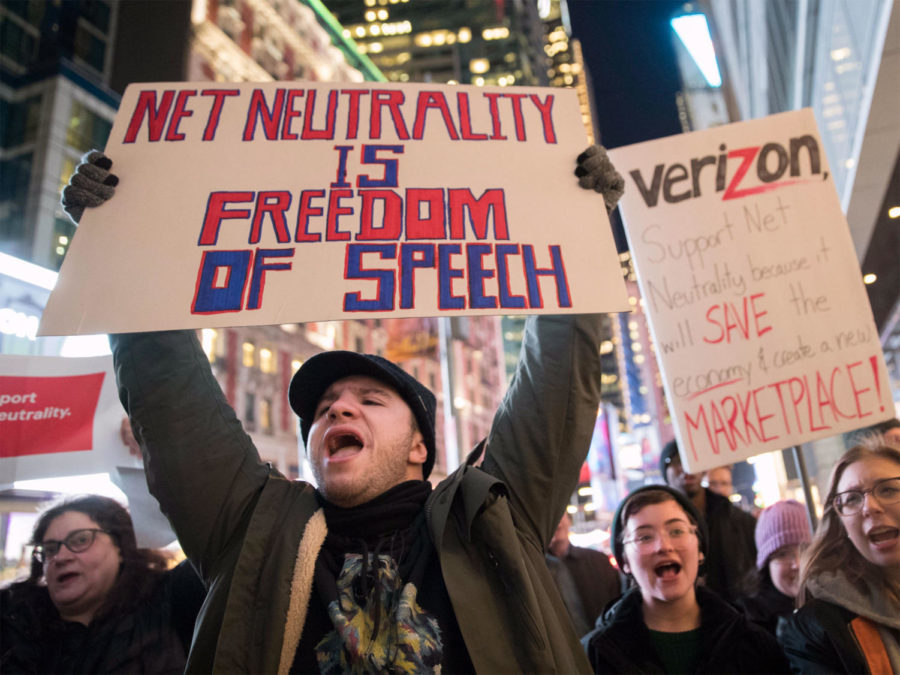Why I’m not neutral about Net Neutrality
December 12, 2017
Dec. 14, 2017 is the day to mark down on your calendar regarding Net Neutrality laws. This is the day the Federal Communications Commission (FCC) will vote on their proposal to revoke them. Many consumers are worried that getting rid of these laws, which require internet providers like Comcast and Verizon to provide them with unbiased, unrestricted internet, will have catastrophic effects on how they access and receive that internet. But much like the paranoia that surrounded Y2K, could all this worrying be unnecessary?
Let’s break it down, because when it comes to restrictions and protections regarding the open internet, not everything is black and white.
Net Neutrality laws as we know them today ensure the public three main things:
- Internet providers cannot prevent you from accessing online content, as long as it is legal.
- Internet providers cannot purposefully slow internet speeds for any legal site.
- Internet providers cannot offer ‘pay for play’ internet speeds. In other words, they cannot sell companies or providers faster or better working internet.
Basically, whoever provides you access to the internet, whether it be cable, LTE or any other provider, cannot pick favorites when it comes to what you can or cannot access.
These laws, however, have not always been so restrictive toward internet providers, and this is where the debate over Net Neutrality lies today. It dates all the way back to the original 1934 Communications Act.
Under this act, two different classifications of service and information providers were created: Title I and Title II. To put it simply, Title I is less restrictive of internet companies, and more limiting to the equal access of internet. Providers categorized as Title II have more sanctions on them and are more strictly required to provide the public with what many people have started calling “open internet.”
Up until 2010, Internet Service Providers (ISPs) were categorized as Title I providers.
In 2010, the FCC tried to write Net Neutrality rules regulating Title I ISPs including Verizon, AT&T and Comcast. Verizon sued the FCC arguing that they had no authority to regulate ISPs under such strict regulations, and they won.
So what did the FCC do in response? They legally changed the ISP’s categorization to Title II, and five years later, they changed Broadband, another term for cable internet, to Title II as well.
The current FCC administration, run by Ajit Pai, a former lawyer for Verizon, is not trying to completely get rid of an unbiased internet, but they are pushing to reclassify ISPs as Title I.
This distinction is what many supporters of Title I use for leverage. They criticize advocates of the “open internet” and argue that in switching from Title II to Title I, the decreased regulation of ISPs will unlock massive potential for online development.
I think these arguments are a futile attempt for big business supporters to cover up the fact that if the Title I classification returns, a massive economic opportunity for ISPs would open, big business would be able to outbuy their smaller competition for internet speeds and our right to information as Americans could be threatened.
My first two points go hand in hand. Without the Net Neutrality laws that we associate with Title II, companies will be charged by ISPs for faster internet speeds. The ISPs, including Verizon that Pai used to work for, will gain a huge source of income. Additionally, large scale, nation-wide companies will be allowed to buy these speeds. Smaller business will not be able to afford fast internet speeds, becoming basically out-bought by the bigger companies. Competition online will decrease for those big companies, and they may, in a sense, monopolize their internet presence just by being able to afford it.
We, as Americans, pride ourselves on having freedom of speech and a right to most information; however, in giving ISPs more power over what we can and cannot easily access online, we are giving up some of those rights. For example, if you use Verizon as your ISP, and a website comes out against Verizon, since they control your internet speeds, they can make accessing that one website very difficult, simply out of a personal bias.
The ISPs would be able to decide how fast you can access sites simply based on who pays them the most money.
If the FCC revokes the Net Neutrality laws we know today, access to different internet sites could be like a corrupt grocery store: Coke would be sold at the front of every aisle and at every register before you checked out. But, if you wanted to buy Fanta, you would have to go to the very back of the store and then wait in a 20 minute line.
Consumers have a right to be presented with all the soda options on an equal playing level to see their options. Revoking the Net Neutrality Laws would get rid of that right.
Like I said, the vote is on Thursday, Dec. 14. This vote will reveal if the FCC sides with consumers and basic rights or Big-business and ISPs. If, after reading this article, you find yourself wanting to preserve the “open internet” Americans experience today, write to your local congressman at https://www.battleforthenet.com. It’s not too late for you to voice your opinion for what is right.


















![Movie poster for [Rec] (2007).](https://www.lionnewspaper.com/wp-content/uploads/2023/04/rec-640x900.jpg)




